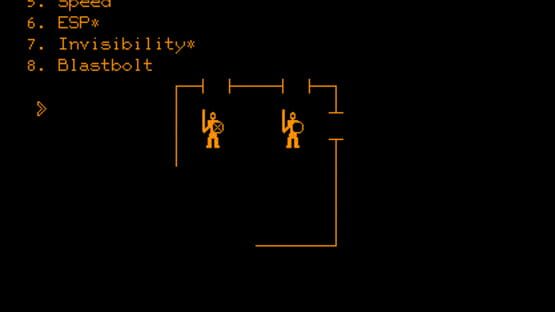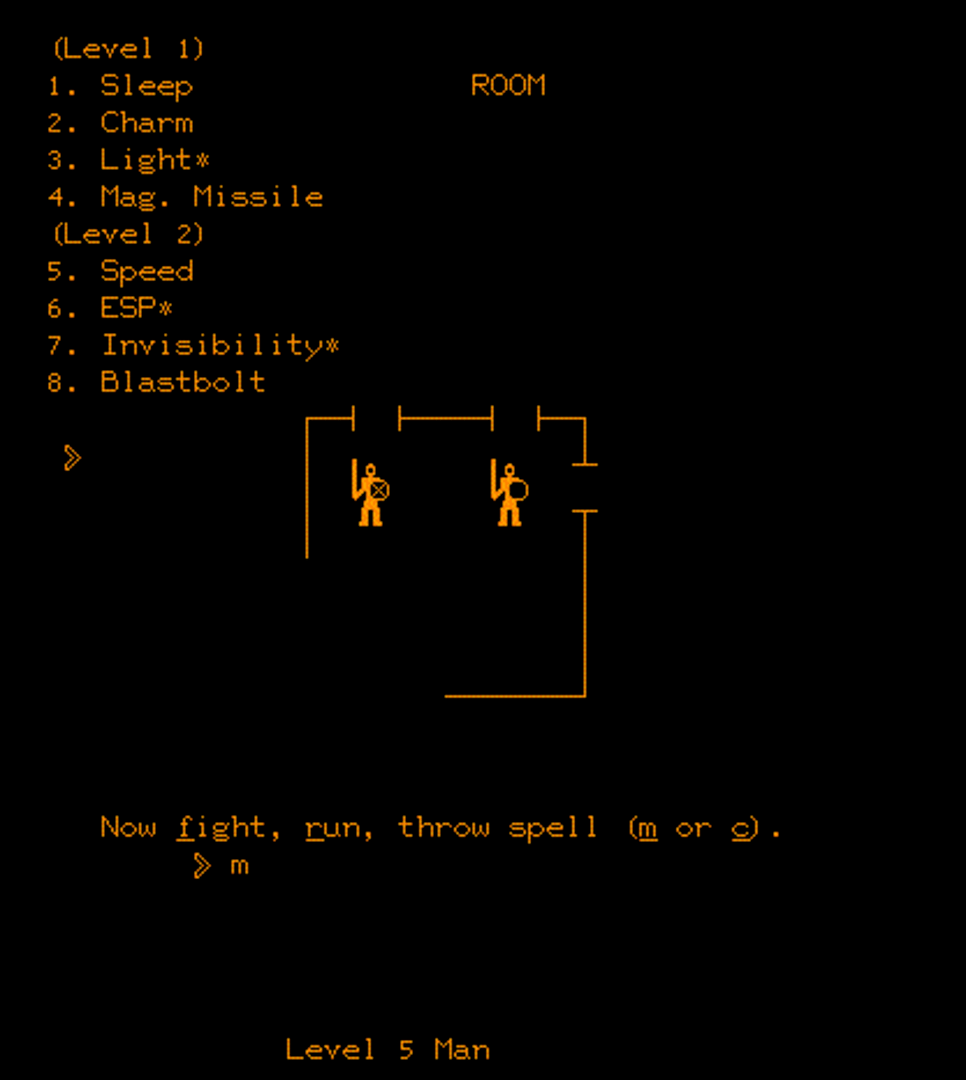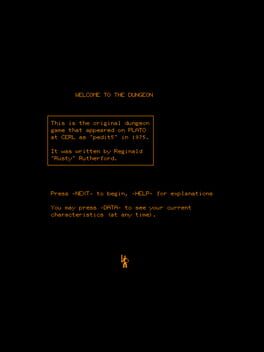

Also known as pedit5, it is the earliest known dungeon crawler role-playing game.
Reviews View More
The definite article, or it would be if the mythical, swiftly deleted m199h PLATO game was as stat-heavy as alumni remember. All these old mainframe games ran the risk of removal and erasure, even programs we recognize now as essential in the history of interactive media. Like the souls of doomed adventurers lost in the dark, the most accessible of '60s and '70s computer video software lived and died on the whims of plucky creators vs. system operators and their bosses trying to maintain their services. Students at colleges using the now obsolete PLATO educational network and timesharing infrastructure made amazing time-wasters under these conditions. From them we got pivotal text-and-image pioneers in genres ranging from space sims to, of course, role-playing adventures.
The Dungeon, or pedit5 as it's known, was the first fully-featured dungeon crawling computerized role-playing game, made less than a year after the first edition of TSR's Dungeons & Dragons. You can play it today thanks to cyber, a modern PLATO emulator and network with pre-made demo user logins for anyone who'd like to try PLATO software. So I decided to get some quality time with the close ancestors of games like Beneath Apple Manor, Akalabeth, Rogue, and then the Ultima & Wizardry pantheons leading into today.
Building a character, or just choosing one of the legacy adventurers saved on cyber1, takes relatively little effort. It's nice to play with a cleaned-up, simplified form of the original D&D's character creation framework, needing only a few stats and some items to get started. pedit5, like most PLATO games preserved today, has a short, fairly usable manual you can consult before playing. It's not long before your stick-figure spelunker gets dropped into a series of eventful corridors, wireframe-thin as they are.
pedit5's main problems come from a mix of simplistic mechanics and the inability to escape death. Luck is definitely not on anyone's side here, except the monsters who will jump you and unceremoniously win or die. Combat's entirely automated past your decision to flee or fight, and more attention goes to finding secret doors and using spells out of battle. This auto-combat system is a kind of handwaving—designer Rusty Rutherford's way of saying he couldn't adapt the tabletop game's encounter mechanics. (It's also possible he just didn't have time to, being a student and having to evade PLATO's sys-ops while coding the game in a public channel.) Still, it's very unsatisfying to win a few scuffles, then get downed by the last monster you expect, only to try this non-randomized set of dungeon floors again.
There's still a good enough base here that later PLATO RPGs, mainly dnd and pedit5's successor orthanc, would use to great effect. As is, Rutherford's game was the spark others needed to try out TSR's revolutionary story-wargame system and make their own versions to play and share. This mirrored the tabletop market's own reactions to D&D, with competitors like Tunnels & Trolls + RuneQuest arriving not long. Graduates from the US Midwest who'd sunk their years into PLATO projects like this would themselves make games for the first wave of personal computers. Ever wonder how we got from scrappy little rulebooks to the likes of Final Fantasy? It all comes back to works like The Dungeon.
Shout-outs to whoever made the Spock character, among other pop culture personas you can choose to play. You don't see any of this reflected in the game's graphics, though they're nice and pristine compared to anything the initial batch of Apple II, TRS-80, and Commodore PET games could offer. Give pedit5 a try, or its improved sequel orthanc, but don't feel obligated to clear The Dungeon. I'm more interested in getting to the bottom of other PLATO classics, anyway.
The Dungeon, or pedit5 as it's known, was the first fully-featured dungeon crawling computerized role-playing game, made less than a year after the first edition of TSR's Dungeons & Dragons. You can play it today thanks to cyber, a modern PLATO emulator and network with pre-made demo user logins for anyone who'd like to try PLATO software. So I decided to get some quality time with the close ancestors of games like Beneath Apple Manor, Akalabeth, Rogue, and then the Ultima & Wizardry pantheons leading into today.
Building a character, or just choosing one of the legacy adventurers saved on cyber1, takes relatively little effort. It's nice to play with a cleaned-up, simplified form of the original D&D's character creation framework, needing only a few stats and some items to get started. pedit5, like most PLATO games preserved today, has a short, fairly usable manual you can consult before playing. It's not long before your stick-figure spelunker gets dropped into a series of eventful corridors, wireframe-thin as they are.
pedit5's main problems come from a mix of simplistic mechanics and the inability to escape death. Luck is definitely not on anyone's side here, except the monsters who will jump you and unceremoniously win or die. Combat's entirely automated past your decision to flee or fight, and more attention goes to finding secret doors and using spells out of battle. This auto-combat system is a kind of handwaving—designer Rusty Rutherford's way of saying he couldn't adapt the tabletop game's encounter mechanics. (It's also possible he just didn't have time to, being a student and having to evade PLATO's sys-ops while coding the game in a public channel.) Still, it's very unsatisfying to win a few scuffles, then get downed by the last monster you expect, only to try this non-randomized set of dungeon floors again.
There's still a good enough base here that later PLATO RPGs, mainly dnd and pedit5's successor orthanc, would use to great effect. As is, Rutherford's game was the spark others needed to try out TSR's revolutionary story-wargame system and make their own versions to play and share. This mirrored the tabletop market's own reactions to D&D, with competitors like Tunnels & Trolls + RuneQuest arriving not long. Graduates from the US Midwest who'd sunk their years into PLATO projects like this would themselves make games for the first wave of personal computers. Ever wonder how we got from scrappy little rulebooks to the likes of Final Fantasy? It all comes back to works like The Dungeon.
Shout-outs to whoever made the Spock character, among other pop culture personas you can choose to play. You don't see any of this reflected in the game's graphics, though they're nice and pristine compared to anything the initial batch of Apple II, TRS-80, and Commodore PET games could offer. Give pedit5 a try, or its improved sequel orthanc, but don't feel obligated to clear The Dungeon. I'm more interested in getting to the bottom of other PLATO classics, anyway.
